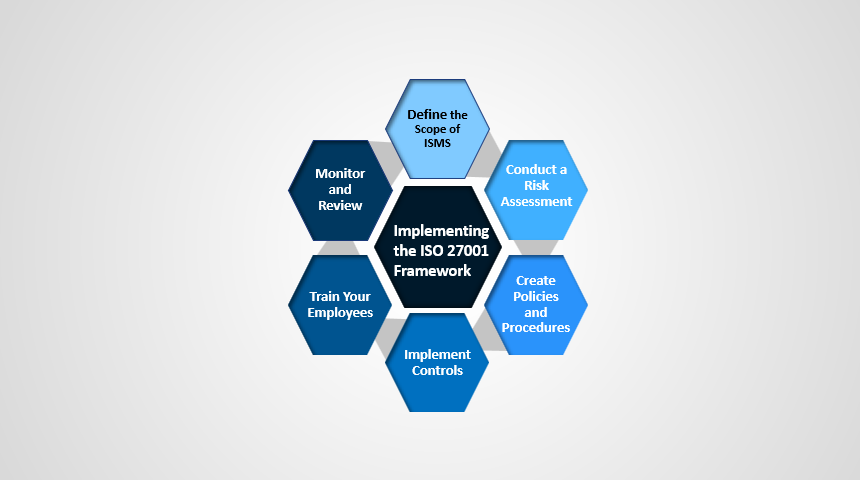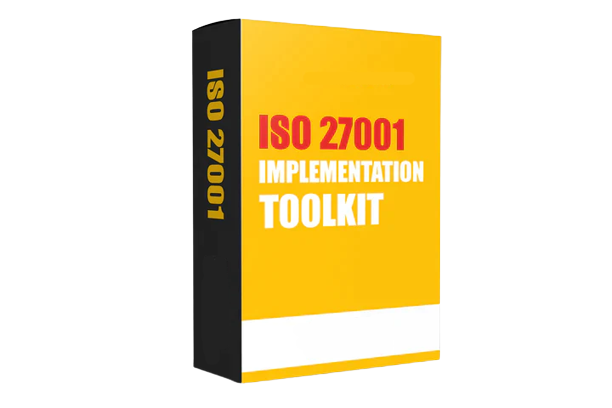ISO 27001 Framework
ISO 27001 compliance is a prerequisite for any organization that wants to bid on contracts with the government or businesses that demand high-level data security.
Implementing the ISO 27001 Framework
The following are some of the most important points that businesses should keep in mind when implementing the ISO 27001 Framework:
1. Define the Scope of the Information Security Management System(ISMS): Businesses must have a good understanding of the ISMS before implementing ISO 27001. It is important to identify the assets and risks associated with each asset.
2. Conduct a Risk Assessment: Conducting a Risk Analysis is a critical part of the ISO 27001 implementation framework. It involves identifying and assessing risks that may impact the integrity, confidentiality, and availability of data assets.
3. Create Policies and Procedures: Once the business has identified risks, it must develop policies and procedures that will allow it to manage and mitigate those risks. All stakeholders should be informed about these policies and procedures, aligning with the ISO 27001 standards.
4. Implement Controls: Businesses must implement controls to help them manage risks identified in the risk assessment. These controls can be of a technical, physical, or administrative nature. These controls must be aligned to the ISO 27001 standard and implemented consistently.
5. Train Your Employees: Employees are a key component in the protection of your information assets. It is, therefore, essential that employees are properly trained in the policies and procedures implemented.
6. Monitor and Review: The ISO 27001 framework demands that businesses monitor and review ISMS's continuously. This includes evaluating the effectiveness of policies and procedures implemented and identifying areas for improvement.
Importance of ISO 27001 Framework
ISO 27001 provides a structured approach to information security management. This ensures that sensitive data are protected from cyber threats. The ISO 27001 framework can help organizations in many ways.
1. Legal and Regulatory Compliance: With the growing number of data breaches around the globe, governments are passing laws and regulations that force businesses to protect sensitive information. ISO 27001 helps organizations meet these requirements.
2. Enhancing Customer Confidence: Customers expect businesses to protect their data against cyber threats. Implementing the ISO 27001 framework allows organizations to demonstrate their commitment to data protection and increase customer trust.
3. Reducing the Risk of Cyber Threats: ISO 27001 is a standard that provides a systematized approach to managing and assessing the risks associated with sensitive information. This framework can help organizations to identify potential vulnerabilities and reduce the risk of cyber threats.
Benefits of Adopting the ISO 27001 Framework
Adopting this framework can have numerous benefits for businesses of all sizes. In this article, we will explore some of the key advantages of implementing the ISO 27001 Framework.
1. Enhanced Data Security: One of the primary benefits of adopting the ISO 27001 Framework is improved data security. This standard helps organizations identify and assess their information security risks, allowing them to implement appropriate controls to protect sensitive data from unauthorized access, theft, or damage.
2. Increased Customer Confidence: With data breaches becoming more common, customers are becoming increasingly concerned about the security of their personal information. By demonstrating compliance with the ISO 27001 Framework, organizations can instill trust and confidence in their customers, assuring them that their data is being handled in a secure and responsible manner.
3. Legal and Regulatory Compliance: Compliance with data protection laws and industry regulations is a top priority for organizations in today's digital landscape. The ISO 27001 Framework provides a comprehensive framework for meeting these legal and regulatory requirements, ensuring organizations are in full compliance with applicable laws and regulations.
4. Competitive Advantage: Implementing the ISO 27001 Framework can give organizations a competitive edge in the marketplace. By effectively managing their information security risks and demonstrating compliance with international standards, businesses can stand out from their competitors and attract potential clients who prioritize data security.
5. Improved Risk Management: The ISO 27001 Framework emphasizes a risk-based approach to information security management. By systematically identifying, assessing, and treating information security risks, organizations can make informed decisions regarding resource allocation and risk mitigation strategies.
6. Cost Savings: While implementing the ISO 27001 Framework requires an initial investment in terms of resources and training, it can ultimately lead to significant cost savings in the long run. By proactively managing security risks, organizations can prevent costly security breaches, legal penalties, reputation damage, and the associated financial implications.
7. Continual Improvement: The ISO 27001 Framework promotes a culture of continual improvement within organizations. Through regular risk assessments, audits, and performance evaluations, businesses can identify areas for enhancement and implement necessary improvements.
Conclusion
Implementing the ISO 27001 framework is a complex process that requires meticulous planning and attention. Following these tips, businesses can improve their security posture to protect their information assets from potential threats.




